Firstly – an important distinction for our international audience!
Different countries refer to the education of a child at 5 years old using conflicting terms.
In the US, children usually attend Kindergarten for one year from the age of 5, and go on to 1st Grade and the rest of their schooling following this.
However in countries like New Zealand, Kindergarten is usually the term for pre-school activity as a 3-4 year old which takes place prior to starting school – and Primary Schooling begins with Year 1 at the age of 5.
Today we’ll be referring to this initial phase of our children’s education from the age of 5 as kindergarten which I’m sure will be most familiar to the majority of our community.
Now before we get to my Kindergarten Readiness Checklist, let’s cover some questions parents have asked me over the years, about how best to prepare their children…
Why should I help prepare my child for starting kindergarten?
There’s no two ways about it – starting kindergarten is an exciting time, but it also brings lots of changes and challenges. Both for our children and for us as parents!
Preparing your child for these changes and giving your child some “school skills” before they start will help tremendously, allowing them to settle in right away and helping them to begin their learning as quickly as possible.
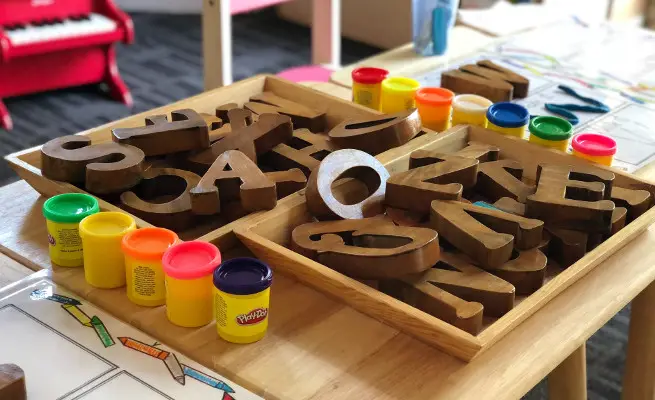
Should my child know their alphabet before starting kindergarten?
The expectation for this varies now across States and Countries.
Many schools don’t expect children to come equipped with alphabet knowledge.
Personally, I think it is highly preferable if your child has made a start to learning the alphabet, particularly recognizing the letters in their name.
Making alphabet learning fun is the key.
Magnetic letters on the fridge or whiteboard are always popular and surprisingly effective, as are alphabet flashcards with a picture prompt e.g. “A is for Apple”. These really help with learning the letter name and the sound.
Some other fantastic and easy methods I’ve used with my own daughter and seen used to great effect with my classes kids are things like:
- Alphabet writing in the sand
- Chalk writing
- Writing out the alphabet and giving the child plastic letters or handwritten ones to match up what is written on the sheet.
- Alphabet and phonics songs on YouTube.
- Write out your child’s name and have it somewhere they can easily see it everyday.
- Magnetic letters of their name on the fridge.

Should my child be able to read before they start kindergarten?
No this isn’t a requirement (but of course is a wonderful head-start for them if it is possible).
One suggestion is that they’ll enjoy learning some basic sight words that will help them immensely when they do start reading in kindergarten.
There are a multitude of useful methods that I’m a real fan of:
- Flashcards
- Play dough words
- Essential word lists
- Dolch sight words etc
I don’t read books – should I?
Yes, definitely 🙂
Set a good example for your child!
There are numerous studies showing the direct connection between making reading books a normal enjoyable pastime in the home, and the child’s subsequent reading ability and enthusiasm for the written word.
In addition to your own reading, make time to read a range of books with your child as well each day, including fiction and non-fiction, introducing them to different concepts and widening their knowledge of the world around them (and you might learn something yourself along the way too!)
Should my child be able to write before starting kindergarten?
While not a requirement for this age group, it is definitely widely regarded as beneficial – and children with these skills are very apparent when they start in my class.
It is very helpful if children can hold a pencil and use a comfortable grip when writing.
If children can use coloring pencils and crayons this is useful too.
Being able to recognise their name is recommended, and writing the letters of their first name is a great start.
Should my child know how to use a pencil properly before they start?
Being able to hold a pencil correctly is important so that children can make quick progress, being able to write their name and complete activities that require coloring, line drawing and other such things.
Teachers will assist your child to have the correct pencil grip, but if they’re already comfortable with this it’s one less thing they need to attempt to grapple with – quite literally in this case!
There are some great pencil activities available online as free printable worksheets. The child will trace over lines and images, aiding pencil grip and fluidity.
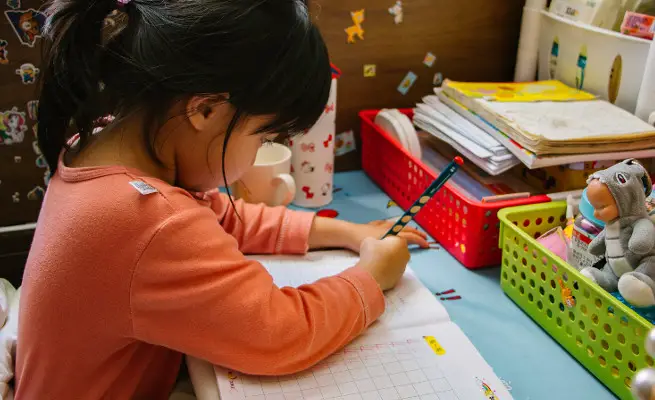
Isn’t everything digital these days? Why would kids need to use pen and paper?
In the Junior years there is less of a focus on digital technology, and is most commonly used for things like songs, movement to music, interactive stories and so on.
Children will write their stories in exercise books and complete reading and maths activities in books at times too.
Having the skill of being able to write is important. even in the information age.
Should I teach my child about Numbers before they start?
Ideally your child should be able to count to 10, but it is quite common to see kids start with little to no understanding of numbers or counting.
It definitely doesn’t need to be this way though!
There are just so many opportunities for counting in daily life which will help their kindergarten prep – and right from the earliest age our kids can be getting to grips with the concept and laying the groundwork to let them jump into their learning from the first day.
- Making numbers fun – counting every day objects.
- When collecting stones count each one.
- Line up toys and count them.
- Count animals in picture books.
- Number songs from 1-10.
- Begin with being able to count to 10 before working on number recognition.
What about social skills and independence?
There are many other things to consider when it comes to kindergarten readiness than simply your child’s academic ability, and I’d encourage you to take the time to consider things such as:
- Unpacking their own bag.
- Keeping track of their own belongings.
- Putting their lunch box and drink bottle away in the correct place.
- Putting on and taking off their own sweatshirts.
- Being able to put their shoes on (and eventually tie their own laces).
- Being able to hold a pencil correctly and do things like coloring in.
- Your child should be able to follow instructions from teacher.
How can I socially prepare my child for schooling?
Provide them with plenty of opportunities to interact with other children and adults.
Most children who go to daycare or other early childhood education will already have these skills.
Encourage your child to have the confidence to speak to others, to greet adults and answer them when spoken to. This is very important to foster in your child so they can build on this throughout the year, and beyond into their further education.
Initially this might even be the difference in having the social skills and confidence to respond to the simplest of things like when the teacher says good morning to them.
Work on sharing and thinking of others when it comes to sharing toys, equipment and children wanting to play something different.
When should I start preparing my child for kindergarten?
Working on preschool activities from time to time at home will always be useful.
Nearer the time they are about to start kindergarten, perhaps around 1-2 months out you should visit the school to have a look around, and begin talking with your child about what their experience will be like.
Buy their kindergarten clothing or uniform and let them try it on.
Take them to choose a new school bag and lunch box – this helps them have ownership.
Work on recognizing their name, pencil grip activities and drawing at home.
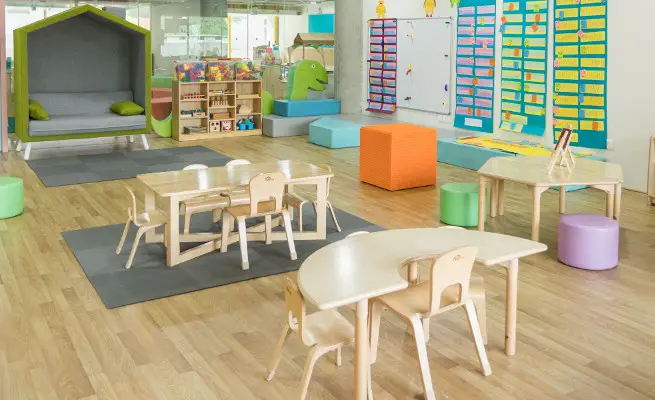
Does toileting need to be considered before they start?
Most children will be fully toilet trained and be able to take themselves to the bathroom before they start kindergarten.
It is important that children can independently go to the toilet themselves upon starting schooling, including being able to wash their hands well.
If there are any concerns you might have as a parent around this, you might like to include a change of underwear and perhaps one or two items of clothing in their bag in case of accidents.
Speak to the teacher before your child starts kindergarten if you think your child may need some extra support with this.
My child is very anxious about starting kindergarten – how can I help with this?
Speak positively about kindergarten and schooling in general, and point out all the great experiences they will have!
Visit the school out of hours so they can see the buildings and playgrounds.
Attend pre-starting school visits if these are offered. This will enable your child to get a feel for the classroom, meet the teacher and their peers and begin to learn the routines of the classroom.
Speak to the teacher and discuss any questions or concerns your child may have with them.
Make a routine once school has started, as a parent you might come into the classroom, we promptly read one quick story, your child gets 2 hugs – and then you leave. We’ll see you in the afternoon.
These simple routines can really support rapid settling, and give your child a wonderful positive rhythm to their introduction to schooling.
Beyond what I do at home, should I investigate other early learning or preschool centres?
There are a range of early learning options out there including kindergartens, play centres and privately paid for daycare outfits – and this also varies widely by country.
Playcentre will most commonly have a strong emphasis on learning through play.
Most private early learning centres will have a “getting ready for school” session for 4 year olds. In this session they work on school skills – sitting on the mat, writing, alphabet and numbers, scissor skills etc.
Visiting a range of early learning centres that you are interested in will help you decide on which one is right for your child.
Home based care is also a good option, where you child is cared for by 1 caregiver and there will be up to 4 or 5 children taking part too, for social interaction. This is common in many countries such as New Zealand, and is also quite prevalent throughout the US.
Can teachers pick out the kids whose parents helped them get ready for starting kindergarten?
Yes – children who arrive already knowing their colors, shapes and being able to recognise and count to 10 stand out – and it means they can hit the ground running with their learning!
What sorts of differences do you notice in these kids?
Children are all taught based on their individual needs and grouped accordingly for their learning.
For those children who start kindergarten with alphabet and number knowledge it means they can progress more quickly, and they more easily pick up new learning.
I always love to see children coming to class with some self management skills, alphabet and number knowledge and an eagerness to learn.
How long does it take for kids to catch up with their classmates in those first few years? Can they?
Children start kindergarten and their schooling with varying life and learning experience and they learn at their own pace.
Some children start kindergarten and hit the ground running, while others are not so ready for schooling and it will take longer for them to settle and feel comfortable.
Once this happens the learning can begin.
Children are taught on where they are at, and while most kindergartens and schools around the world have benchmarks they expect children to be at by a certain stage, this is not always possible for all children.
Certainly with a determined effort from teacher, child and parent positive gains can be made in virtually every case however! Something I’ve taken great joy in over my many years of teaching.
Teachers, how would you prepare your own child for schooling?
By doing lots of fun learning from an early age. As early as possible!
Tapping into my child’s emerging interests – for example animals and reading books about animals, counting animals, visiting zoos etc.
From age 3 or 4 working on alphabet, numbers and pencil grip with various activities each week.
Lots of play based learning activities – there are plenty of ideas for this on Pinterest too!
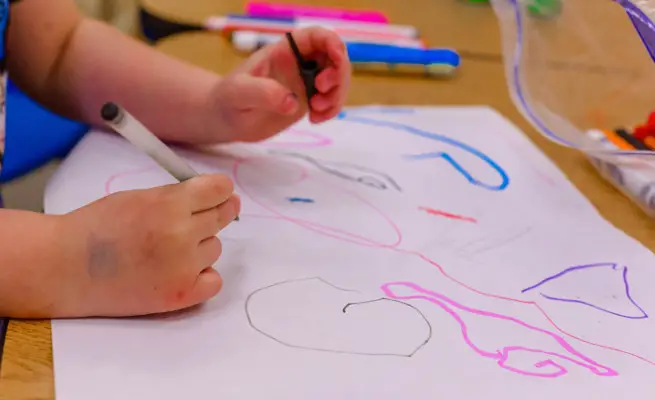
When it comes to actually starting schooling, what should my child bring in their backpack?
This will depend on where you are in the world.
In the UK you would include your child’s packed lunch (if they aren’t having school lunches) and their book bag.
Stationery will be provided by the school.
In New Zealand you will need to include their packed lunch, drink bottle, sunhat (during terms 1 and 4) and their books and pencils etc.
Many schools have New Entrant stationery packs that you can purchase from the school office before your child starts.
This will include a reading cover, exercise books, pencils, crayons etc.
As mentioned previously, a spare change of underwear and clothes in a plastic bag would also be a good idea if you think there might be any toileting accidents.
Once my child has started, can I just leave the teacher to do all the teaching from that point?
All levels of schooling, especially the early years will work best when there is a home-school partnership.
Being involved and interested in your child’s schooling is beneficial, without a doubt!
And it doesn’t need to be a mammoth effort.
Simply setting aside some time each evening to read the book together that has been sent home, flicking through some flashcards of high frequency words and some numbers is helpful, and will make a noticeable difference in most cases.
Keep this time short: 10-15 minutes, as children have busy days even from a young age and will be tired.
Check in from time to time with the teacher to see how your child is going and to see if there is anything you could support them with at home.
Is my child ready for kindergarten?
As we’ve covered, there is a lot to consider even at this early stage.
But don’t feel overwhelmed!
Just the fact that you’re here looking into the multitude of ways you can help prepare your child for this next step is a good sign.
The information I’ve provided through the previous questions and answers have hopefully clarified things for you, and I wish you all the best with your adventure ahead 🙂
Take a look at my following checklist and easily keep track of how their preparation is going:
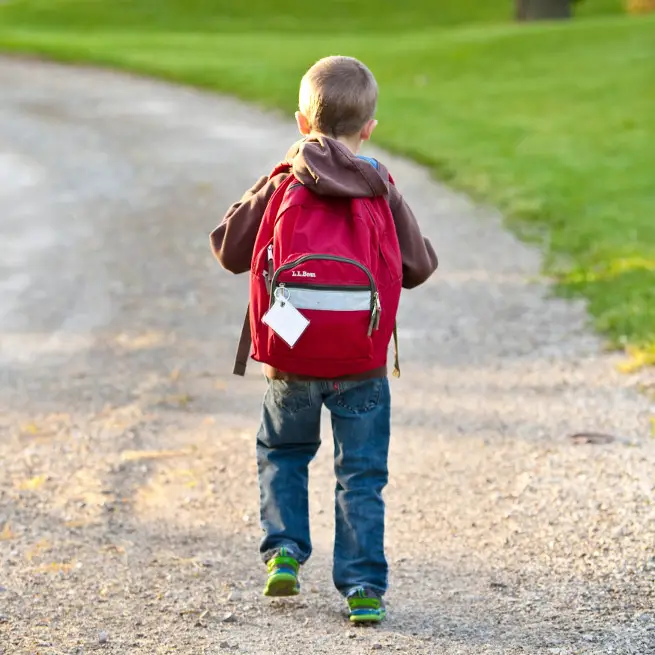
Kindergarten Readiness Checklist
▢ Start learning the alphabet.
▢ Teach your child the spelling of their own name.
▢ Read to your child often.
▢ Encourage an interest in books and reading.
▢ Teach your child to hold a pencil.
▢ Teach them how to use scissors safely.
▢ Make counting to 10 easy for them everyday.
▢ Encourage independence.
▢ Show them how to pack and unpack their bag.
▢ Help them be responsible for their own belongings.
▢ Should be able to get shoes on (laces are a bonus!)
▢ Don’t forget about confidence with social interactions.
▢ Visit the kindergarten class at your chosen school.
▢ Make sure your child is confident with toileting.
▢ Keep it positive and encourage enthusiasm.

